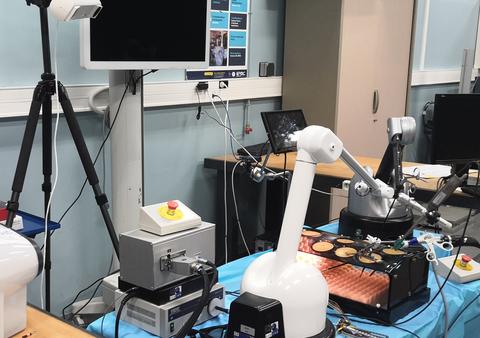
Advanced Systems and Robotics (SAR)
The SAR training aims to train specialists in the design, modeling, analysis, optimization and control of complex robotic systems. It covers the numerous research and development needs related to advanced "mechatronic" systems in sectors of activity ranging from the mechanical and mechatronic production industry to the ground and air transport industry, as well as the health technology sectors.
The SAR course is open to apprenticeship.
Objectives
The teaching proposed in this Master's program of the Automation and Robotics specialization provides basic multidisciplinary knowledge in engineering sciences specific to this field as well as specific knowledge to deal with problems related to mechanical systems with autonomous capabilities. The training focuses on the aspects of modeling, simulation, and control of these systems, while integrating the multidisciplinary aspect specific to robotic systems (perception of the environment, reflex type control, artificial intelligence, interaction with the environment). The program aims to train specialists in the emerging field of complex mechanical systems interacting with their environment, with a research/development profile capable of meeting the needs of many fields of activity: transportation, production, robotics, home automation, health technologies, etc.
Organization
The training is spread over the two years of the M1 and M2 Master’s degree. The scientific fundamentals and the tools of the engineer are introduced in the first year by the common core curriculum. The second year covers the elements of the specialization. Some of the courses are taught at the École Nationale Supérieure des Arts et Métiers: the student can design his or her program by choosing a sub-set of course units within the teaching on offer.
Two internships are offered, in the first year (8 weeks minimum) and in the second year (six months). A multidisciplinary project is also offered in S3 of the second year of the Master's program.
Target audience and prerequisites
The program is open to students with a general degree in mechanics, electronics, physics or mathematics, or an equivalent degree.
The second year is open to students with a Master 1 in Mechanics, Robotics, Electronics, Physics or Mathematics; to students with an engineering degree and solid knowledge of Mechanics, Electronics, Physics, or Mathematics; or to students in their final year at an engineering school (ENSAM).
Organization : details
First semester (30 ECTS)
|
|
Title |
ECTS |
|
Common core department |
Digital signal processing scientific computing |
6 |
|
Common core EEEA / robotics |
Python object programming |
3 |
|
English |
3 |
|
|
Common core of curriculum |
Automatic linear |
6 |
|
Introduction to robotics and artificial intelligence |
6 |
|
|
SAR course |
Mechanics of continuous solid media |
3 |
|
Vibrations |
3 |
In S1, the apprentice students do not take the English and Solid State Mechanics courses. The remaining 6 ECTS are dedicated to an evaluation of skills in a company.
Second semester (30 ECTS)
|
|
Title |
ECTS |
|
Common core department |
Orientation and Professional Insertion (OIP) |
3 |
|
Internship |
6 |
|
|
Common core of curriculum |
ROS and experimental robotics |
6 |
|
Machine learning |
3 |
|
|
SAR course |
Object programming in C++ |
3 |
| CAO-DAO | 3 | |
|
Robotic modeling and simulation |
6 |
In S2, the apprentice students do not follow the ROS and experimental robotics UE, nor the internship UE. Instead, a 12 ECTS UE is dedicated to the evaluation of their work in the company. Finally, the OIP teaching is replaced by an English UE (3 ECTS).
Third semester (30 ECTS)
The third semester consists of a common core curriculum that is followed by all students, whether apprentices or not. The remaining courses are selected from a set of optional courses. The assignment of these optional courses is made by the pedagogical team according to three criteria: a) the student's wishes (collected during the first day of the academic year), b) the capacity of each course, c) the student's experience in relation to the prerequisites of the requested course.
Common core (15 ECTS)
|
Title |
ECTS |
|
Manipulating robots |
6 |
|
State estimation and identification for robotics |
6 |
|
English |
3 |
Optional courses
|
Title |
ECTS |
| Advanced automatics |
6 |
| Deep learning | 6 |
| End of study project | 6 |
| Mobile Robotics | 6 |
| Non-linear automatics |
3 |
| Haptic interfaces | 3 |
| Perception for robotics | 3 |
| Physical simulation | 3 |
| AI for robotics (Open in Off-Contract) | 3 |
Fourth semester (30 ECTS)
The 4th and final semester is entirely devoted to an internship for students in initial training, or to a full-time period in a company for apprentice students.
Opportunities
Recruitment prospects are in companies concerned with robotic, mechanical or mechatronic systems, interactive systems, intelligent systems, and in particular, by the applications of these technologies to health:
- Automotive, transportation, aeronautics, electronics, production automation, manufacturing robotics, telecommunications and multimedia industries
- Service robotics, home automation
- Maintenance sector
- Health technology sector
- Public or private research laboratory, higher education.
Contacts
Responsible for the course
Pascal MORIN
Administrative Manager
Pascale ANTOINE
Campus Pierre et Marie Curie
Département Sciences pour l'Ingénieur
Bâtiment Esclangon, 2e étage
Case courrier 164
4, place Jussieu
75005 Paris
